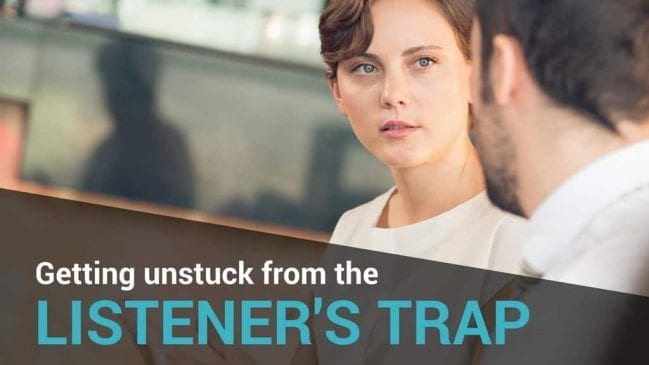We just got an email about getting stuck in the “listener trap”:
“[…] After about 6 months of “friendship”, these people turn to me as someone to talk to, as I always seem interested in their daily affairs.
The difficulty is that they just want to talk about themselves. I am afraid that if I start talking about myself, these friends would find me whiny and stop being friends with me!
I personally think that I may be not interesting enough to people, and thus people don’t seem to take interest in what I say or do – they just like me for being someone they can vent to or talk to or seek advice from.
At first, I enjoyed the attention but right now I’m getting a little tired of this as it never seems to be my turn to speak – the conversation always turns back to them.
So, I’d like to ask for some advice – without coming across as fake, what can we do to make ourselves more interesting to our peers?”
– Darrel
Great question Darrel!
This is a common trap when you start becoming a better listener: Most people love to talk about themselves and their problems to a good listener.
In the beginning, when you develop your listening ability, it feels great.
People will want to talk to you for hours, about themselves… And you probably keep it going by asking good follow-up questions, reflecting on what they said, and making them feel heard.
But in the heat of the moment, you might ignore what you think is interesting and focus on what you notice that they like talking about.
The problem here is that you’ve created a pattern in your relationship where you’re the listener, and they’re the talker.
It’s natural for them to assume you like to listen because that’s what you’ve shown with your behavior. So that’s how the pattern is created. And then you start feeling trapped always being the listener.
What we really want is a balanced relationship where we can talk about things we BOTH find interesting, not what just one of us finds interesting.
So how do you break out of The listener’s trap?
There’s no magic bullet to make the other person start asking you lots of questions on a regular basis. Most people just aren’t that socially skilled (or interested in others).
So, we try to escape the listener’s trap by talking more about ourselves. It’s intuitive, but it doesn’t work very well.
(It’s often not that interesting to hear someone talking about themselves.)
Instead, you want to find mutual interests and talk about those.
I can’t stress this enough:
For a friendship to work long-term, you need to find mutual interests and use these as the foundation for your conversations.
David told me about a mindset that simplifies the idea of mutual interests. He said:
“I have the ambition to always talk about what the other person also finds interesting”.
It’s not about NEVER being allowed to talk about anything else, but with that ambition, you will come a long way.
For example, I have one friend I never talk psychology with (even if it’s a big part of my life), because I know he’s not interested in that. But, we’re both interested in nutrition and health, so I might bring that up in a conversation with him. We can talk about that for hours.
Then I have another friend who’s not really interested in nutrition, but we both appreciate discussing philosophy and also deeper personal issues. So I talk more about that with him.
With another friend, I talk more about politics, traveling, and gaming.
I love that each friend gives their own unique flavor to the conversation.
These interests don’t need to be the “passions of your lives”. It should just be something you’re sure that both of you enjoy talking about.
Here’s a great article by David about finding mutual interests.
It’s also important to keep the 50/50 rule in mind: Spend as much time talking as you spend listening. That helps remind me to keep my conversations balanced, especially when I start talking too much.
I can’t stress this enough: If we talk too much whenever we get a question, people will soon stop asking us questions. No one wants to open floodgates.
But what if the other person just keeps talking about themselves and never lets me talk?
Unfortunately, some people are too self-centered or lacking in social skills that they don’t notice or realize you want to talk, too.
You could bring it up with them in a constructive way. I’ve actually done this myself with a few friends and I’ve been surprised by how willing most of them have been to change when they realize their error.
I said:
“Hey, I feel like sometimes our conversations are a bit unbalanced where I’m mainly listening and you’re the one talking. Is that something you’ve noticed?”
However, some people are a lost cause, as you can’t change someone who isn’t willing to change.
In those cases, I recommend investing less time in that person and focus on other potential friends. Why build a relationship with someone if they don’t give anything back?
Reply in the comments below. I look forward to hearing your thoughts!








Thanks, I remember stuff like this happening sometimes; it’s hard!
I also sometimes offer a curious vibe, look around the room so I can breathe – and offer an angle not thought of 🙂 I appreciate my friend Jenny saying, “You see things that others don’t see.” 🙂
Goodnight, and thanks for encouraging mutuality, too.